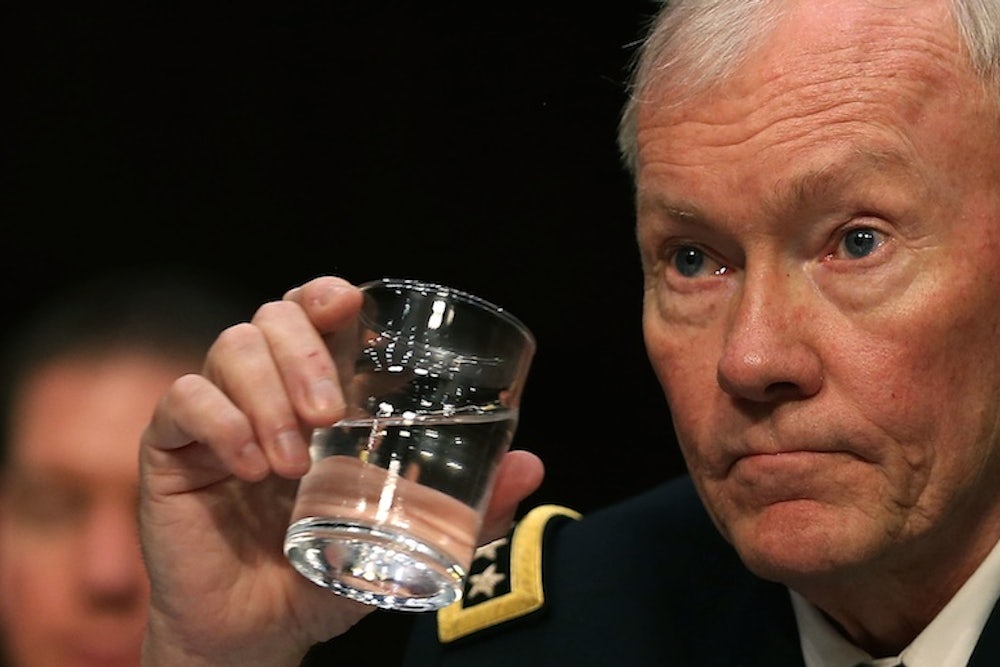Gen. Martin Dempsey, the chairman of the Joint Chiefs of Staff, told the Atlantic Council that even if the beleaguered Syrian opposition somehow ousted President Bashar al-Assad, a development that appears increasingly unlikely, the country would still be consumed with terror, chaos and starvation. "If Assad took his family and all of his cronies and departed Syria today, how does that country ... articulate itself?" he asked.
Dempsey noted that the Syrian opposition maintains no governance structure to provide goods, services and security; no force capable of holding ground to administer aid and wage attacks against the regime; and no counterterrorism capability to root out al Qaeda-affiliated groups in the country. "And we're not on a path currently to provide that," he said.
— John Hudson, Foreign Policy, May 14, 2014
One would gather two broad conclusions from General Dempsey's words: Syria, its people, and (for that matter) the civilized world would not necessarily be better off with Assad, his family, and his cronies quickly gone; and there is nothing afoot in terms of American policy to correct the governance deficiencies he itemized. For the visiting officials of the Syrian National Coalition the general's remarks amount to a reality check if not a slap across the face.
It is quite true that the departure of the Assad regime would not, per se, spare Syria years or even decades of acute hardship. All the more reason for the United States and its allies to work with Syrian counterparts to design and implement a governance project covering all of liberated Syria: something strongly advocated by this writer in and out of government. It is simply not enough to recognize the Syrian National Coalition as the legitimate representative of 23 million Syrians. Neither is it enough to recognize that organization's offices in the United States as foreign missions. What matters is people providing governmental services, starting with security, in areas that would otherwise be run by an Iran-dependent regime or by radical Islamists. "Recognition" has a nice ring to it. But as General Dempsey suggests, it means nothing where it really matters: inside Syria.
A policy built on something other than words could indeed address a "governance structure to provide goods, services and security." The United States has, in fact, steadfastly refused to offer the kinds of security assistance that would encourage the nationalist Syrian opposition to establish such a structure inside Syria. Who, after all, would defend such a structure against regime air and artillery assets generously supplied by Russia and against foreign fighters organized by Iran? Would we be content to stand by and witness a Levantine Bay of Pigs? The administration seems to be frozen by the prospect of actually trying to do something. And as Dempsey indicated, "we're not on a path" that would involve the doing of things.
It is one thing to decry a persistently bad situation which one has worked hard to change. It is quite another to critique, with distant, disinterested objectivity, a dismaying set of circumstances one might have mitigated if only one had tried. The United States and its allies have wrung their hands over the propriety of supporting non-sectarian nationalists while two sets of terrorists—the Assad regime and al Qaeda affiliates—have had no shortage of enthusiastic backers. The West has bemoaned the "militarization" of the Syrian conflict and has denied meaningful assistance to Syrian nationalists. Iran and Russia have had no problem with the idea that their client might prevail militarily, and Gulf donors have had no reservations financing murderers in the name of Islam. Is it any wonder that a decent alternative to both extremes has not taken root inside Syria?
General Dempsey asks rhetorically how Syria would "articulate itself" if the Assad regime were to disappear "today." It is an odd question, one that seems to imply that there is something inherently stabilizing, understandable, and perhaps even reassuring about the continued presence of a known entity, albeit one fully engaged in mass homicide.
It would be one thing for Dempsey to have endorsed explicitly his commander-in-chief's August 18, 2011, directive to Assad to step aside while pointing out, quite accurately, that Syria's problems will be considerable for quite some time following that happy day. It would be quite another thing for him to imply that anyone beyond Assad, his family, his cronies, Iran, and Russia would benefit from the regime staying for an additional twenty minutes. One hopes that was not his meaning. Is there, after all, anything remotely positive about how Syria articulates itself today with the rapacious Assad-Makhluf clan as the sole proprietor of the so-called Syrian Arab Republic Government?
General Dempsey's description of the situation is not grossly inaccurate. Still, it is not a random act of nature that explains why there is nothing in place inside Syria to assume the powers of government once the murderous ruling clan is gone. It is not accidental that there is no military force in Syria capable simultaneously of defending vulnerable civilians from regime and Al-Qaeda depredations. If, in his capacity as principal military adviser to the president, General Dempsey wishes to recommend steps aimed at correcting these deficiencies, he has the duty and statutory authority to do so. Let's hope he is doing precisely that.
